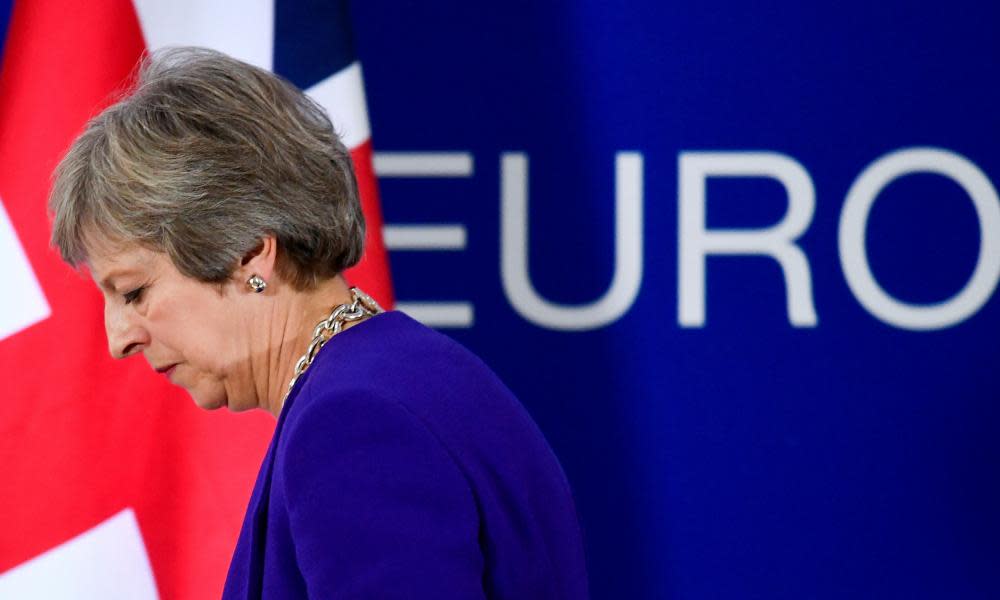The Guardian view on Theresa May’s Brexit strategy: failing on two fronts

Theresa May’s failure to make progress in Brexit talks this week is a function of having to conduct parallel negotiations, one at home and one abroad. The two conversations overlap, but rhetoric that animates the domestic debate can be far removed from the arguments the prime minister encounters across the Channel.
This is most evident in discussion of arrangements for Northern Ireland – the main obstacle to a withdrawal agreement. In Brussels, the issues are seen in terms of legal commitments: enforcement of the EU’s single market rules across post-Brexit borders; the Good Friday agreement, which makes the border question uniquely sensitive; and the December 2017 deal that sealed the first phase of exit talks. In that document the UK signed up to the “backstop”, keeping Northern Ireland aligned with EU regulations (thereby obviating the need for a restored border with the Irish Republic) in the event that no more innovative solution could be found.
Brexiters configure the same question differently. They do not treat the backstop as a logical solution to the technical problem they created, but as a wicked device for separating Northern Ireland from mainland Britain. The 2017 deal is dismissed as a disposable bargaining counter, even by Conservatives who were in cabinet when it was signed. Many leavers seem prepared to treat the peace process and the treaty that underpins it with the same casual, reckless contempt. Ignorance of Irish history is, sadly, not a new feature of English politics, but Brexit has brought new obtuseness. There is a grim eagerness to project pernicious motives on to the EU side, in keeping with familiar patterns of Eurosceptic paranoia. Under that warped lens, the backstop becomes a territorial aggression by Brussels. Dublin is conceived either as a pawn or a provocateur in this nefarious game.
The banal truth is that the EU asserted its combined interests as a multi-member union (with Ireland benefiting from collective solidarity), while the UK wasted months failing to even understand its own interests. The backstop impasse has arisen at the collision point of two contradictory British objectives. One is Mrs May’s capitulation to Brexiter demands for severe rupture from EU markets. The other is her commitment to honour the Good Friday agreement.
It should be obvious what has to give. The refusal to countenance long-term participation in the single market and customs union was made rashly, without consideration for the economic implications, back in 2016. The unwisdom of that choice has been highlighted by every subsequent turn of events. It is not a stance that can comfortably command a majority in parliament. Instead of adapting to political realities at home and abroad, broadening the scope of what Brexit might entail, Mrs May has narrowed her options on both fronts. She is struggling to get a deal and struggling to persuade a domestic audience that the deal she might get is worth having.
Fear of defeat in parliament lies behind government moves this week to limit the opportunities for MPs to amend the motion approving or rejecting Brexit terms. Ministers are hoping to arrange what has been advertised as the “meaningful vote” as a binary choice between the prime minister’s deal and no deal at all. Such a stark menu would, it is imagined, intimidate MPs into accepting any kind of orderly withdrawal over the prospect of a chaotic one. This desperate manoeuvre reveals an administration that has run out of ways to win arguments around Brexit and is resorting instead to procedural subterfuge.
In Brussels this week, Mrs May played for time and was indulged by EU leaders. Their post-summit statements exuded weary patience and cautious optimism. They recognise that the main obstacles to progress are in Westminster and that the onus is on the British prime minister to find some room for manoeuvre at home. Since that is the requirement for success in the negotiations, Mrs May should be thinking of ways to keep options open – and so allowing parliament to put options on the table, too. Instead, the prime minister seems determined to keep closing down channels for potential compromise. It is neither an honourable nor an effective strategy.

 Yahoo News
Yahoo News 
